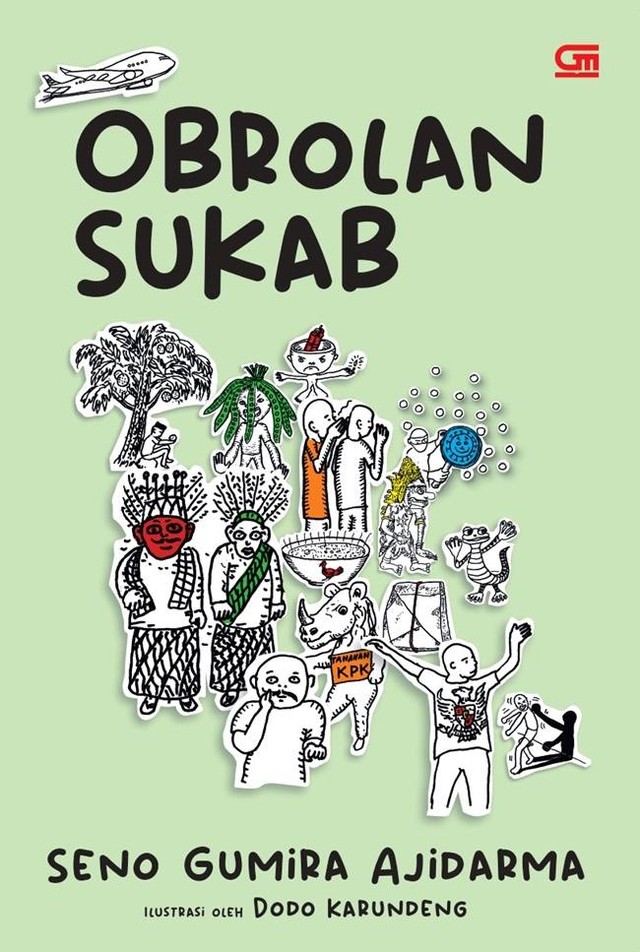Tentang KamiPedoman Media SiberKetentuan & Kebijakan PrivasiPanduan KomunitasPeringkat PenulisCara Menulis di kumparanInformasi Kerja SamaBantuanIklanKarir
2025 © PT Dynamo Media Network
Version 1.101.0
Konten dari Pengguna
Obrolan Sukab by Seno Gumira Ajidarma: Social Discourse Wrapped in Literature
27 Februari 2024 10:18 WIB
·
waktu baca 5 menitTulisan dari Roma Kyo Kae Saniro tidak mewakili pandangan dari redaksi kumparan

ADVERTISEMENT
The statement that "literature is a reflection of life" holds profound truth. Literature isn't just comprised of entertaining, imaginative tales; instead, it serves as a mirror reflecting the complex reality of human existence. Literary creations, exemplified by Seno Gumira Ajidarma's Obrolan Sukab, can present humanitarian and political concerns in a powerful and thought-provoking manner.

Ajidarma, through his narrative, not only depicts the worldly aspects of everyday life but also encapsulates the essence of human conflicts, including conflicts, diversity, and political aspirations. In this work, readers are confronted with a diverse social landscape, where characters function as mirrors reflecting a plethora of issues contemporary society faces.
ADVERTISEMENT
In his latest work titled Obrolan Sukab by Seno Gumira Ajidarma presents a captivating compilation of essays and sketches that are intellectually stimulating and entertaining. Through his clever wit and deep analysis, Ajidarma guides readers through social and political issues relevant to our daily lives. By introducing fictional characters like Sukab and his friends, the author leads readers into deep contemplation on solidarity, economics, and the bewildering urban existence. Ajidarma explores new and challenging perspectives on every page, prompting readers to reconsider their perceptions of the world around them.
The book consists of 50 columns from Kompas and PanaJournal.com, such as "Sukab's New Year," "Sukab and Brainwashing," and "Sukab and What is Normal." This book is also a collection of ideas that emerged between 2016 and 2018. Priced at Rp 168,000,-, this book comprises 448 pages filled with intellectual depth and entertainment, making it a must-read for those who want to absorb social and political intelligence carefully. With a circulation of 1500 copies and GM number 623202009, Obrolan Sukab is ready to inspire and refresh readers' intelligence across all age groups.
ADVERTISEMENT
The writings presented in this book are imbued with societal sketches covering various light and serious topics, such as government policies, political situations, food, etc. However, Ajidarma's style serves as a light critique that is easily understood. The narratives conveyed in a relaxed and humorous manner provide essential information regarding various events happening in Indonesia, including the issue of nationalism in the section "Sukab and Nationalism."
"Nationalism is about a passport, or is it about conscience? Someone failed to become a minister because they held a United States passport" (Obrolan Sukab, p. 45).
"Of course! Do you think someone is cool, smart, and genuinely thinks about Indonesia, but instead of serving, when they come back, they get arrested? That's why they become citizens of the country where they sought refuge!" (Obrolan Sukab, p.48)
ADVERTISEMENT
"That's right! It's a shame if someone with this ability level is asked to work just anyhow. They must think, if they can't be useful for Indonesia, they can still be useful for the world, for fellow humans too." (Obrolan Sukab, p. 49).
In Obrolan Sukab by Seno Gumira Ajidarma, discussions about Sukab and nationalism prompt deep reflection on national identity and commitment to the country. Ajidarma presents the difference between the concept of nationalism associated with formalities like passports and the true essence of nationalism rooted in conscience and dedication to Indonesia. Statements in the book such as "Is nationalism about passports, or conscience?" and "Some individuals were disqualified as ministers because they held United States passports" emphasize the dilemma between personal identity and allegiance to the nation. These questions investigate the conflict between loyalty to one's homeland and opportunities abroad.
ADVERTISEMENT
Furthermore, in the ensuing conversation, the author depicts that genuine nationalism is not only about symbolic indications like passports but is more centered on the willingness to serve and contribute to the nation and fellow humans. Statements like "Do you believe that there are people smarter and more sincere than Indonesia, but individuals loyal to their interests?" underscore the importance of loyalty and active contribution to Indonesia, regardless of personal interests.
Additionally, quotes like "If they can't be useful for Indonesia, they can still be useful for the world, for fellow humans too" affirm that true nationalism transcends national boundaries, encompassing awareness of global humanity and concern for common interests. Therefore, in Obrolan Sukab, Ajidarma invites readers to contemplate the true essence of nationalism while highlighting the importance of loyalty, dedication, and active contribution to the nation and humanity.
ADVERTISEMENT
Social discourse in literature often exposes complex and diverse portrayals of reality. In Obrolan Sukab by Seno Gumira Ajidarma, one of the writings highlighting political exile issues presents an intriguing depiction of the social-political situation in Indonesia during a specific period. Narratives of individuals barred from returning to Indonesia due to suspected ties to the banned Communist party reflect a social reality filled with conflict, tension, and confusion.
Through such narratives, literature provides a profound representation of history and societal conditions in the past. Authors use their writings to depict the political and social complexities that may not be fully revealed in official historical records. In simpler terms, literature serves as a lens that allows readers to delve into deeper realities through symbols, metaphors, and narratives developed by the author.
Though its style is light and relaxed, Obrolan Sukab covers various relevant and diverse societal topics. In this way, literary works serve as mirrors reflecting multiple aspects of social and political life, prompting readers to contemplate, question, and engage in dialogue about the realities they face. Thus, Obrolan Sukab is a compilation of writings and a work that captivates readers and encourages them to explore the hidden social and political meanings within its words and stories.
ADVERTISEMENT

